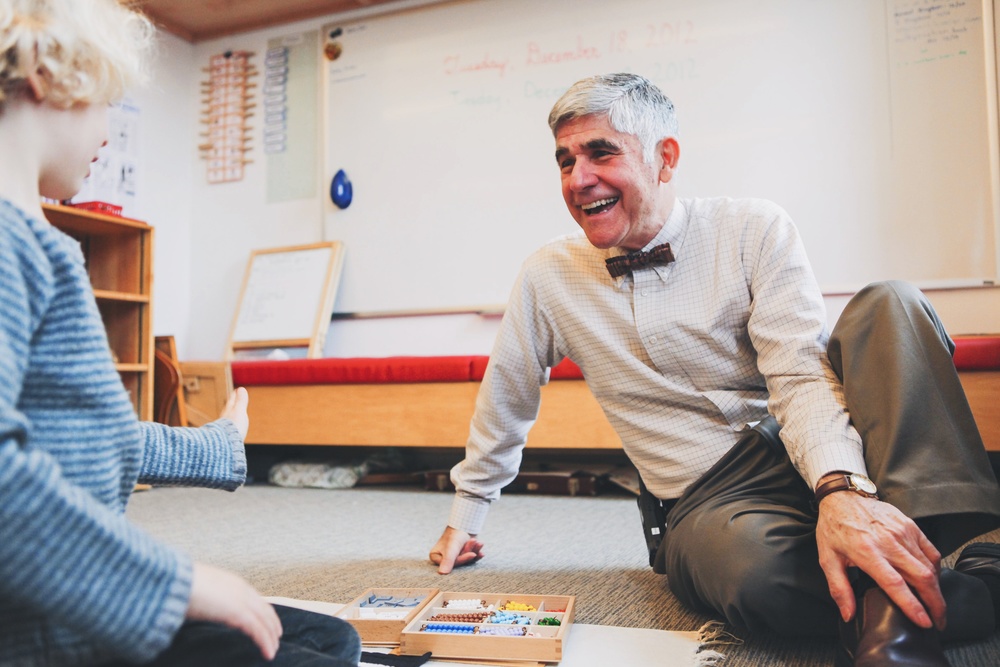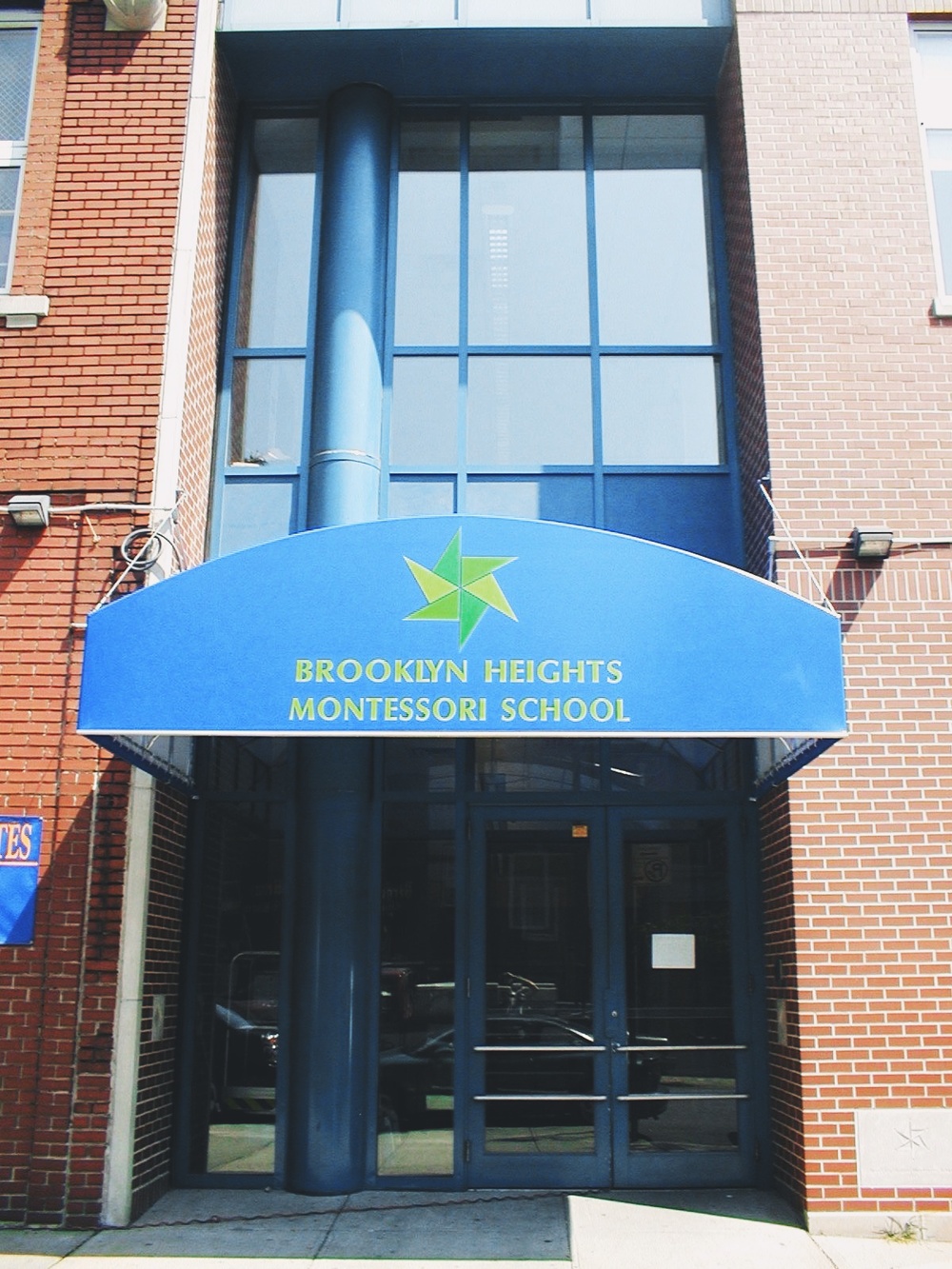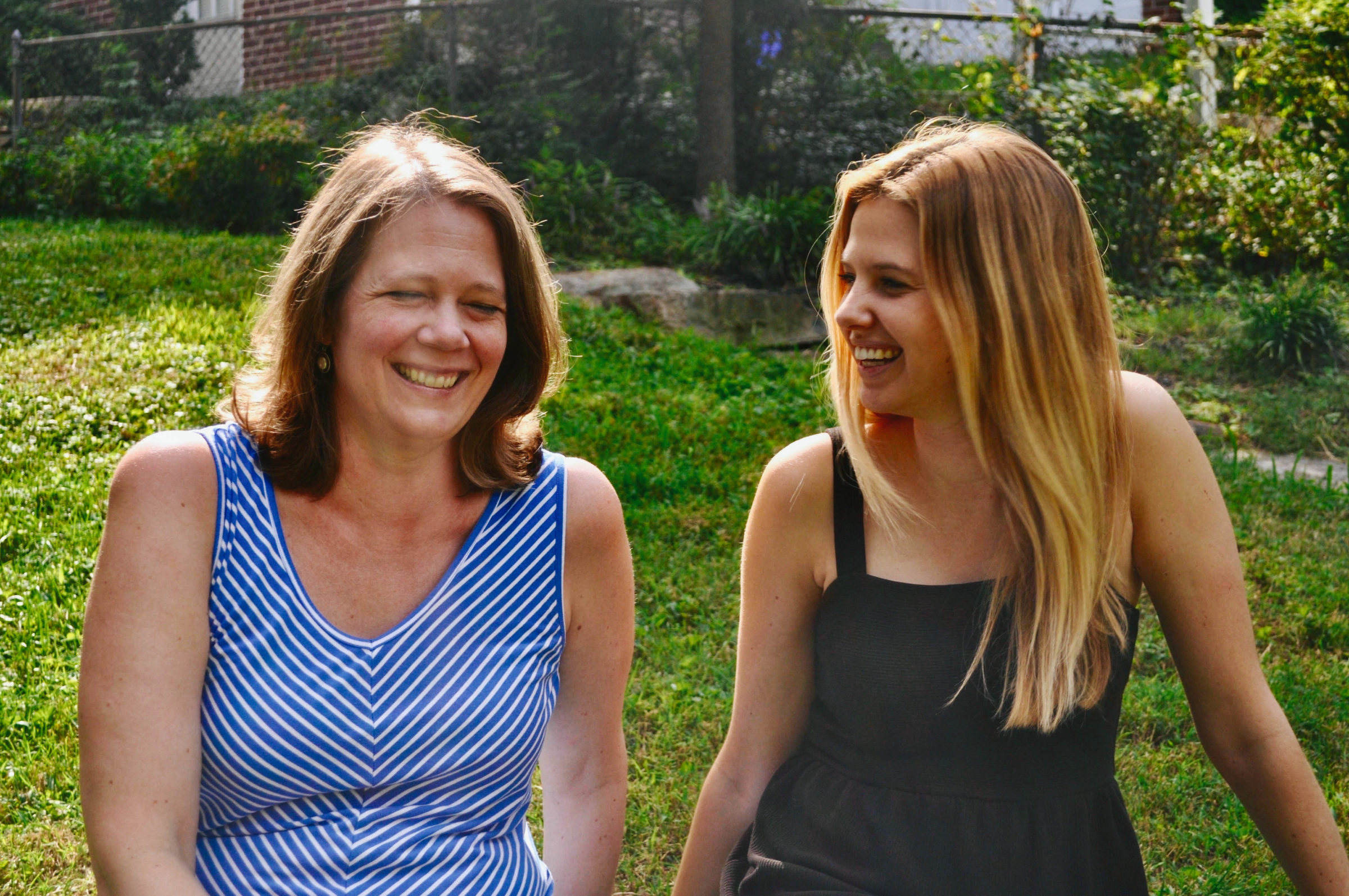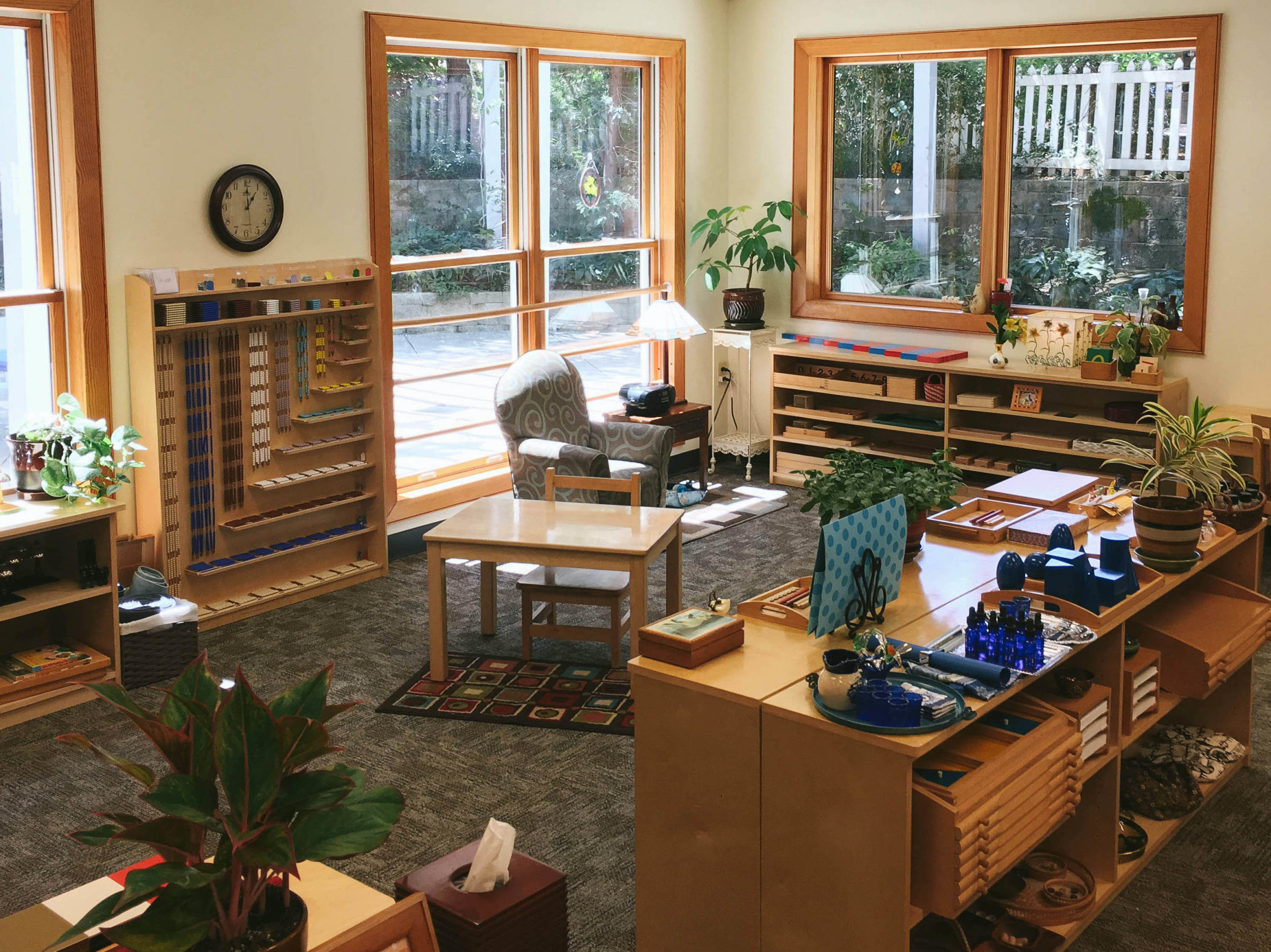Spotlight Dane Peters
Spotlights
We have a very special Spotlight to share with you. Meet Dane Peters, of the Brooklyn Heights Montessori school. It was such a pleasure to discover his background, hear his advice, and learn what might be in store for the future of education. We hope you enjoy!

Q: Can you tell us a little bit about yourself? Your background, your interests, your dreams?
A: Born and raised in a strong family and in traditional public schools through undergraduate work, I have always enjoyed listening and talking to people. Be they friends, children, colleagues, or students, I now know why I stand at the front door of my School over the past 20 years greeting students, teachers and parents. Teaching—no, learning—is the battery that keeps me going, and people are where my power supply gets charged. My life-long learning has manifested itself in many ways; to name a few: learning to fly, teaching, sky diving, being an officer in the Marine Corps, serving as a husband and parent for 40years, writing, blogging, discovering Montessori, serving others, and now grand parenting.
Q: Now that the hardest question is out of the way: What’s your favorite color?
A: I believe if you view “Crayola Doesn’t Make a Color for Your Eyes” you will see my favorite color. And do treat yourself by viewing this beautiful video.
Q: Do you have a favorite book? How about a film?
A: I love reading. I am never without one or two books in process. I do tend to lean towards non-fiction but read the likes of Ken Follett, John Steinbeck, and John Irving, and I admit that I do have a passion for middle reader books, especially Newbery Medal winners. If you haven’t read Wonder by R. J. Palacio you must.
There is one book that keeps rising to the top: Viktor Frankl’s Man’s Search for Meaning. Actually, the best way to answer this question is to click over to my blog where I love to talk about the books I read.
I do enjoy watching movies. I often reflect on Pat Conroy’s “The Great Santini” starring Robert Duvall and “Pay it Forward,” starring Haley Joel Osment and Kevin Spacey. Both have so many good family lessons.
Q: When you close your eyes late at night, and imagine waking up and starting a new adventure: what is that adventure?
A: Writing a book. That way I can pass on my experiences and life-long lessons learned to others so they might have an easier time in life.
Q: Can you tell us about your hobbies?
A: Writing, writing, writing, and working with my hands. I love to do home repair activities. Give me a broken faucet, misaligned molding, or a room in need of a painting, and I will enter into what Dr. Mihaly Csikszentmihalyi calls “flow.”
Q: Switching to Montessori, what advice do you have for new Montessori schools?
- Make sure everyone—owner or Board, head or principal, teachers, staff, parents and surrounding community—understands the school’s mission and Montessori philosophy.
- Define the roles and responsibilities of each constituency within the school community, i.e. head/principal leads the operation of the school, Board governs, teachers teach and care for children, parents parent.
- Have plenty of resources—particularly Montessori resources—available for children, and teachers, and maintain a prepared environment.
Q: With that in mind, we suppose the same question can be applied to established Montessori schools.
- Make sure everyone—owner or Board, head or principal, teachers, staff, parents and surrounding community—understands the school’s mission and Montessori philosophy.
- Define the roles and responsibilities of each constituency within the school community, i.e. head/principal leads the operation of the school, Board governs, teachers teach and care for children, parents parent.
- Have plenty of resources—particularly Montessori resources—available for children, and teachers, and maintain a prepared environment.
Q: Can you share with us your experience on the AMS board?
A: Having served on 10 different non-profit boards over the past 20 years, three as Board Chair, I have come to appreciate the beauty of boards that run smoothly and follow best practices; as an aside, Dr. Richard Chait’s Governance As Leadership is the bible of good governance. This is where I feel the AMS Board is presently. With a wonderful Executive Director and 18 committed Directors who are dedicated to Montessori education, I enjoy being with these leaders whether we are on the West Coast, or Florida, or New York City, where the headquarters are located. Often when I consult with schools or give a presentation on governance, I share my experiences with this Board and my own School Board as models.
One of the highlights of this year’s Board work was when the Board met with André Roberfroid, President of AMI, and Virginia McHugh Goodwin, Executive Director of AMI USA. There was no question among those present that it is important for both AMI and AMS to unite behind our Montessori missions and help others understand the benefits of a Montessori education.
Q: Did you have a “Montessori Moment?”
A: Ever since I began my Montessori training, the day I began heading Brooklyn Heights Montessori School, I have accepted — no relished — my Montessori journey. The day I began observing my grand daughter’s absorbent mind through a Montessori lens, was a special Montessori moment.
Q: What’s your favorite Montessori quote?
A: The quote I use over and over again with parents, colleagues, and adult learners is “I know the children are learning when they don’t know that I am in the room.”
Q: What do you think is the best introduction to Montessori?
A: Observing a classroom in action. It is truly magical. My first experience with Montessori education was when I observed a classroom and subsequently sat on the Board of The Cobb School Montessori. Thank you, Mary Lou Cobb.
And, if you cannot get into a classroom, then read Montessori Today by Paula Polk Lillard, or Dr. Mihaly Csikszentmihalyi’s Flow, or Jane Healy’s Your Child’s Growing Mind, or Mind in the Making by Ellen Galinsky, or Drive by Dan Pink. Whether it is a book specifically about Montessori or a book that is inspired by her work, you cannot help but be touched by how her work has endured over the past 100 years, particularly the principles that are forever applicable to today’s child. This is all beautifully illustrated in M. Shannon Helfrich’s book Montessori Learning in the 21 Century.
Q: What continues to inspire you about Montessori?
A: Whenever I peek into a classroom at my school and see toddlers or 3- to 6-year olds or middle schoolers engaged in work, I inevitably stare in amazement. This past summer I read Rita Kramer’s biography of Dr. Montessori. I couldn’t put the book down. Amazed by Montessori’s determination and insight into the child, I wrote for Montessori Life “The Child Whisperer.” I believe that it is a perfect characterization of who she was as a human being, educator, and expert in child development.

Q: How do you feel Brooklyn Heights Montessori has impacted your community?
A: It has become the option of choice for those families who are looking for an education that is not a standardized test factory with a cookie cutter curriculum. And, once you walk through the doors you immediately see and feel a caring staff that appreciate children and guide them using grace and courtesy. A school that respects the child, something we sometimes take for granted in our Montessori communities is a breath of fresh air for many of our families.
Q: What kind of legacy would you hope you and Brooklyn Heights Montessori School will impart to students?
A: A legacy of confidence, a strong sense of self, and the ability to embrace failure as a tool to success. I like to think that Sir Ken Robinson’s TED Talk “Ken Robinson says schools kill creativity” is an excellent vision of how Montessori schools work. Having heard him at both a National Association of Independent Schools Conference and an American Montessori Society Conference, I know what inspires educators; he understands child development and what motivates children and adults. His book The Element stands out as an important book for me.
Q: In what ways do you envision the future of education?
A: Well, we will all come to embrace creative thinking, choice, exploration, empathy, thoughtfulness, and learn to not get hung up on standardized testing. My short piece “930” explains this further.
Technology is going to have an increasingly larger role in education. I have experienced the evolution of listening to music from a 45rpm record to a vinyl album, to an 8-track tape, to a cassette tape, to a CD to an mp3, to now cloud-based listening, e.g. Pandora and Spotify. I love the evolution of books and newspapers. Begrudgingly, I now accept the ease with which I can read an e-book using highlighting, bookmarking, note taking, see a definition or follow a source all with the touch of a finger.
Classroom learning that was once called online learning has evolved into blended learning, that is some classroom learning blended with online learning, e.g. Massive Open Online Learning (MOOC), will soon be all virtual one day. Although I like to think that the younger ages will always have teachers nearby. When imagining the future of education, I often reflect on Aldous Huxley’s Brave New World, and M. T. Anderson’s young adult book Feed and ask about the latter, “Will it get to that?” I guess we’ll have to wait and see.
Finally, I do believe that Dr. Montessori’s genius will always be with us, because in the end, it IS about respecting the child.
Written by:
Baan Dek



